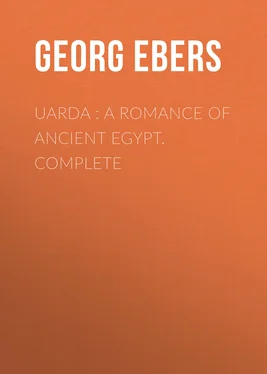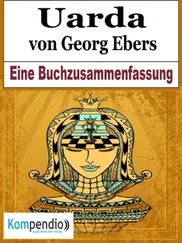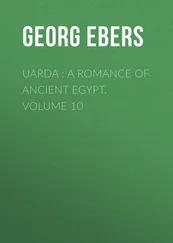Georg Ebers - Uarda - a Romance of Ancient Egypt. Complete
Здесь есть возможность читать онлайн «Georg Ebers - Uarda - a Romance of Ancient Egypt. Complete» — ознакомительный отрывок электронной книги совершенно бесплатно, а после прочтения отрывка купить полную версию. В некоторых случаях можно слушать аудио, скачать через торрент в формате fb2 и присутствует краткое содержание. Жанр: Альтернативная история, literature_19, foreign_antique, foreign_prose, Исторические приключения, на английском языке. Описание произведения, (предисловие) а так же отзывы посетителей доступны на портале библиотеки ЛибКат.
- Название:Uarda : a Romance of Ancient Egypt. Complete
- Автор:
- Жанр:
- Год:неизвестен
- ISBN:нет данных
- Рейтинг книги:4 / 5. Голосов: 1
-
Избранное:Добавить в избранное
- Отзывы:
-
Ваша оценка:
- 80
- 1
- 2
- 3
- 4
- 5
Uarda : a Romance of Ancient Egypt. Complete: краткое содержание, описание и аннотация
Предлагаем к чтению аннотацию, описание, краткое содержание или предисловие (зависит от того, что написал сам автор книги «Uarda : a Romance of Ancient Egypt. Complete»). Если вы не нашли необходимую информацию о книге — напишите в комментариях, мы постараемся отыскать её.
Uarda : a Romance of Ancient Egypt. Complete — читать онлайн ознакомительный отрывок
Ниже представлен текст книги, разбитый по страницам. Система сохранения места последней прочитанной страницы, позволяет с удобством читать онлайн бесплатно книгу «Uarda : a Romance of Ancient Egypt. Complete», без необходимости каждый раз заново искать на чём Вы остановились. Поставьте закладку, и сможете в любой момент перейти на страницу, на которой закончили чтение.
Интервал:
Закладка:
“Who is master,” asked Nebsecht, “excepting God? I can do nothing, nothing at all, and guide my instruments with hardly more certainty than a sculptor condemned to work in the dark.”
“Something like the blind Resu then,” said Pentaur smiling, “who understood painting better than all the painters who could see.”
“In my operations there is a ‘better’ and a ‘worse;’” said Nebsecht, “but there is nothing ‘good.’”
“Then we must be satisfied with the ‘better,’ and I have come to claim it,” said Pentaur.
“Are you ill?”
“Isis be praised, I feel so well that I could uproot a palm-tree, but I would ask you to visit a sick girl. The princess Bent-Anat—”
“The royal family has its own physicians.”
“Let me speak! the princess Bent-Anat has run over a young girl, and the poor child is seriously hurt.”
“Indeed,” said the student reflectively. “Is she over there in the city, or here in the Necropolis?”
“Here. She is in fact the daughter of a paraschites.”
“Of a paraschites?” exclaimed Nebsecht, once more slipping the rabbit under the table, “then I will go.”
“You curious fellow. I believe you expect to find something strange among the unclean folk.”
“That is my affair; but I will go. What is the man’s name?”
“Pinem.”
“There will be nothing to be done with him,” muttered the student, “however—who knows?”
With these words he rose, and opening a tightly closed flask he dropped some strychnine on the nose and in the mouth of the rabbit, which immediately ceased to breathe. Then he laid it in a box and said, “I am ready.”
“But you cannot go out of doors in this stained dress.”
The physician nodded assent, and took from a chest a clean robe, which he was about to throw on over the other! but Pentaur hindered him. “First take off your working dress,” he said laughing. “I will help you. But, by Besa, you have as many coats as an onion.”
[Besa, the god of the toilet of the Egyptians. He was represented as a deformed pigmy. He led the women to conquest in love, and the men in war. He was probably of Arab origin.]
Pentaur was known as a mighty laugher among his companions, and his loud voice rung in the quiet room, when he discovered that his friend was about to put a third clean robe over two dirty ones, and wear no less than three dresses at once.
Nebsecht laughed too, and said, “Now I know why my clothes were so heavy, and felt so intolerably hot at noon. While I get rid of my superfluous clothing, will you go and ask the high-priest if I have leave to quit the temple.”
“He commissioned me to send a leech to the paraschites, and added that the girl was to be treated like a queen.”
“Ameni? and did he know that we have to do with a paraschites?”
“Certainly.”
“Then I shall begin to believe that broken limbs may be set with vows-aye, vows! You know I cannot go alone to the sick, because my leather tongue is unable to recite the sentences or to wring rich offerings for the temple from the dying. Go, while I undress, to the prophet Gagabu and beg him to send the pastophorus Teta, who usually accompanies me.”
“I would seek a young assistant rather than that blind old man.”
“Not at all. I should be glad if he would stay at home, and only let his tongue creep after me like an eel or a slug. Head and heart have nothing to do with his wordy operations, and they go on like an ox treading out corn.”
[In Egypt, as in Palestine, beasts trod out the corn, as we learn from many pictures in the catacombs, even in the remotest ages; often with the addition of a weighted sledge, to the runners of which rollers are attached. It is now called noreg.]
“It is true,” said Pentaur; “just lately I saw the old man singing out his litanies by a sick-bed, and all the time quietly counting the dates, of which they had given him a whole sack-full.”
“He will be unwilling to go to the paraschites, who is poor, and he would sooner seize the whole brood of scorpions yonder than take a piece of bread from the hand of the unclean. Tell him to come and fetch me, and drink some wine. There stands three days’ allowance; in this hot weather it dims my sight.
“Does the paraschites live to the north or south of the Necropolis?”
“I think to the north. Paaker, the king’s pioneer, will show you the way.”
“He!” exclaimed the student, laughing. “What day in the calendar is this, then?
[Calendars have been preserved, the completest is the papyrus Sallier IV., which has been admirably treated by F. Chabas. Many days are noted as lucky, unlucky, etc. In the temples many Calendars of feasts have been found, the most perfect at Medinet Abu, deciphered by Dumich.]
The child of a paraschites is to be tended like a princess, and a leech have a noble to guide him, like the Pharaoh himself! I ought to have kept on my three robes!”
“The night is warm,” said Pentaur.
“But Paaker has strange ways with him. Only the day before yesterday I was called to a poor boy whose collar bone he had simply smashed with his stick. If I had been the princess’s horse I would rather have trodden him down than a poor little girl.”
“So would I,” said Pentaur laughing, and left the room to request The second prophet Gagabu, who was also the head of the medical staff of the House of Seti, to send the blind pastophorus
[The Pastophori were an order of priests to which the physicians belonged.]
Teta, with his friend as singer of the litany.
CHAPTER IV
Pentaur knew where to seek Gagabu, for he himself had been invited to the banquet which the prophet had prepared in honor of two sages who had lately come to the House of Seti from the university of Chennu.
[Chennu was situated on a bend of the Nile, not far from the Nubian frontier; it is now called Gebel Silsilch; it was in very ancient times the seat of a celebrated seminary.]
In an open court, surrounded by gaily-painted wooden pillars, and lighted by many lamps, sat the feasting priests in two long rows on comfortable armchairs. Before each stood a little table, and servants were occupied in supplying them with the dishes and drinks, which were laid out on a splendid table in the middle of the court. Joints of gazelle,
[Gazelles were tamed for domestic animals: we find them in the representations of the herds of the wealthy Egyptians and as slaughtered for food. The banquet is described from the pictures of feasts which have been found in the tombs.]
roast geese and ducks, meat pasties, artichokes, asparagus and other vegetables, and various cakes and sweetmeats were carried to the guests, and their beakers well-filled with the choice wines of which there was never any lack in the lofts of the House of Seti.
[Cellars maintain the mean temperature of the climate, and in Egypt are hot Wine was best preserved in shady and airy lofts.]
In the spaces between the guests stood servants with metal bowls, in which they might wash their hands, and towels of fine linen.
When their hunger was appeased, the wine flowed more freely, and each guest was decked with sweetly-smelling flowers, whose odor was supposed to add to the vivacity of the conversation.
Many of the sharers in this feast wore long, snowwhite garments, and were of the class of the Initiated into the mysteries of the faith, as well as chiefs of the different orders of priests of the House of Seti.
The second prophet, Gagabu, who was to-day charged with the conduct of the feast by Ameni—who on such occasions only showed himself for a few minutes—was a short, stout man with a bald and almost spherical head. His features were those of a man of advancing years, but well-formed, and his smoothly-shaven, plump cheeks were well-rounded. His grey eyes looked out cheerfully and observantly, but had a vivid sparkle when he was excited and began to twitch his thick, sensual mouth.
Читать дальшеИнтервал:
Закладка:
Похожие книги на «Uarda : a Romance of Ancient Egypt. Complete»
Представляем Вашему вниманию похожие книги на «Uarda : a Romance of Ancient Egypt. Complete» списком для выбора. Мы отобрали схожую по названию и смыслу литературу в надежде предоставить читателям больше вариантов отыскать новые, интересные, ещё непрочитанные произведения.
Обсуждение, отзывы о книге «Uarda : a Romance of Ancient Egypt. Complete» и просто собственные мнения читателей. Оставьте ваши комментарии, напишите, что Вы думаете о произведении, его смысле или главных героях. Укажите что конкретно понравилось, а что нет, и почему Вы так считаете.












